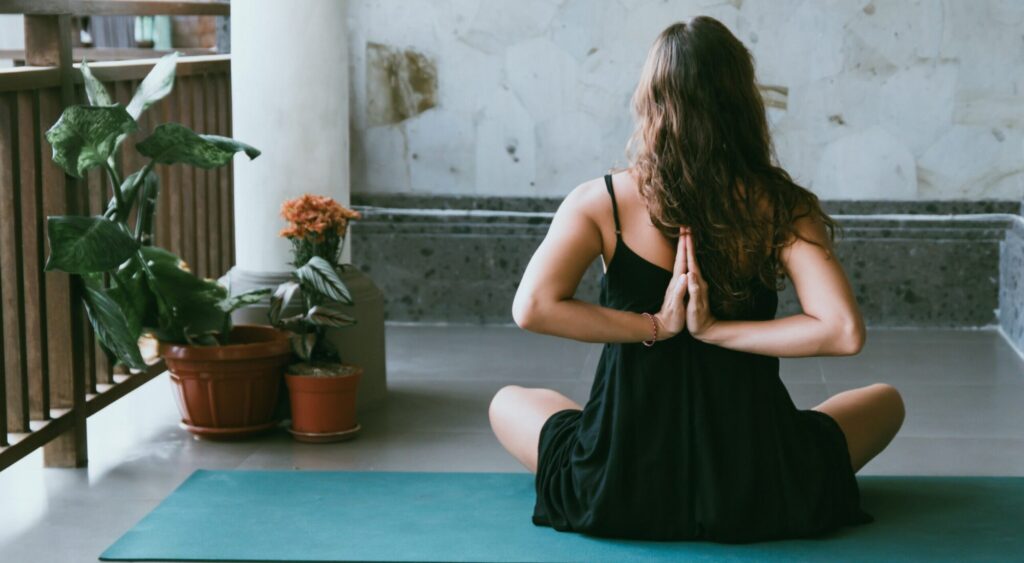Are you struggling to achieve a restful night’s sleep? Incorporating a calming bedtime routine can significantly improve your sleep quality. In this blog post, we’ll explore five simple stretches that can help you unwind, relax your body, and prepare for a peaceful night’s sleep.
The Importance of a Nighttime Routine
A bedtime routine signals to your body that it’s time to wind down and prepare for rest. It can help regulate your sleep-wake cycle, reduce stress, and improve the quality of your sleep.
5 Relaxing Stretches for Better Sleep
These stretches are designed to target key muscle groups, release tension, and promote relaxation.
-
Forward Bend:
- Stand with your feet together.
- Hinge forward from the hips, reaching towards the floor.
- Keep your legs straight or bend your knees slightly if needed.
- Hold for 30 seconds, breathing deeply.
-
Backward Bend:
- Be on your knees on the floor with your knees slightly wide.
- Reach your arms behind to catch the heels of your feet, arching your back maximum.
- Hold for 30 seconds, breathing deeply.
-
Front Arm Line Hold:
- Stand with your feet hip-width apart.
- Hold a 5-foot-long stick, raise your arms overhead to the back, stretching your chest and arms.
- Hold this position for about 30 seconds and relax.
-
Cross-Body Stretch:
- Stand with your feet wider than shoulder-width apart.
- Cross your right arm over your left ankle, reaching for your right hand up straight in the air.
- Gently pull your right hand towards the center, reach the starting position, and relax for 2 seconds.
- Hold for 30 seconds, then switch sides.
-
Side Bend Stretch:
- Stand with your feet wider than hip-width apart.
- Reach your right arm overhead, bending to the left side.
- Hold for 30 seconds, then switch sides.
Benefits of These Stretches
- Relaxation: Calms your mind and body before sleep.
- Improved flexibility: Enhances overall flexibility with consistent practice.
- Reduced muscle tension: Releases tension in the shoulders, back, and legs.
- Better circulation: Facilitates blood flow to aid in muscle recovery.
- Enhanced sleep quality: Promotes deeper and more restful sleep.
- Stress relief: Alleviates stress accumulated throughout the day.
- Posture improvement: Contributes to better posture over time.
- Mind-body connection: Focuses on the present moment for a peaceful transition to sleep.
- Prevention of stiffness: Counters stiffness that may arise from a sedentary day.
- Release of endorphins: Enhances mood and promotes relaxation.
- Joint mobility: Promotes healthy joint movement for overall well-being.
- Mindful breathing: Pairing stretches with deep breaths can create a calming effect.
Incorporating These Stretches into Your Bedtime Routine
To maximize the benefits of these stretches, make them a regular bedtime routine. Aim to do them 30-60 minutes before bed to allow your body to wind down.
Remember, consistency is key. By practicing these stretches regularly, you’ll likely experience improved sleep quality and overall well-being.
Creating a Relaxing Sleep Environment
A conducive sleep environment is essential for a restful night’s sleep. Here are some tips to create a calming atmosphere:
- Darkness: Ensure your bedroom is dark and free from light pollution. Use blackout curtains or an eye mask if necessary.
- Temperature: Maintain a cool, comfortable temperature in your bedroom. Ideally, between 60-67 degrees Fahrenheit (15-19 degrees Celsius).
- Noise reduction: Minimize noise disturbances by using earplugs or a white noise machine.
- Comfortable bedding: Invest in quality bedding, including a comfortable mattress, pillows, and sheets.
- Declutter: Keep your bedroom clean and organized to reduce stress and promote relaxation.
Sleep Hygiene Tips
In addition to a relaxing sleep environment, practicing good sleep hygiene can improve your sleep quality:
- Consistent sleep schedule: Try to go to bed and wake up at the same time each day, even on weekends.
- Limit screen time: Avoid electronic devices at least an hour before bed, as the blue light can interfere with sleep.
- Avoid heavy meals before bed: Eating a large meal close to bedtime can disrupt sleep.
- Limit caffeine and alcohol: These substances can interfere with sleep.
- Manage stress: Practice relaxation techniques like meditation or deep breathing to reduce stress before bed.
By following these tips and incorporating the nighttime stretches into your routine, you can significantly improve your sleep quality and wake up feeling refreshed and rejuvenated.













